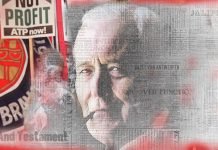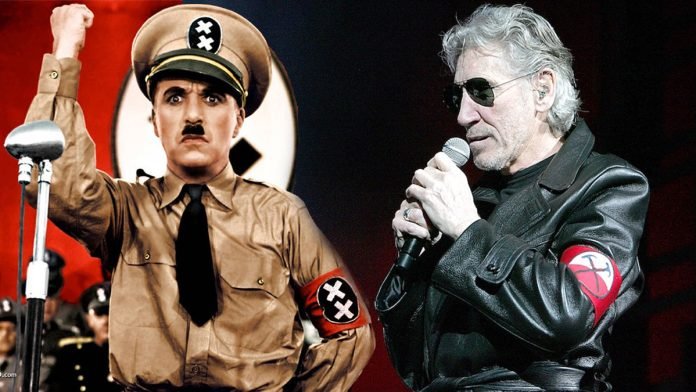
From Waters to Chaplin: Reviving the Spirit of Resistance Through Art
After the controversy, of Germany’s investigation into the renowned musician and Pink Floyd co-founder, Roger Waters, unfolds. The scrutiny arises from Waters’ recent concert performance in Berlin, where Waters took the stage donned in a Nazi-inspired uniform, wielding an imitation machine gun as part of a skit.
The recreation of a scene from Pink Floyd’s 1982 film “The Wall” was intended to mock Nazi ideology, a performance art form he has been known for since the early ’80s. One that has received awards and even a stamp issued by the post office to celebrate the band and its success with smashes like ‘The Wall’.
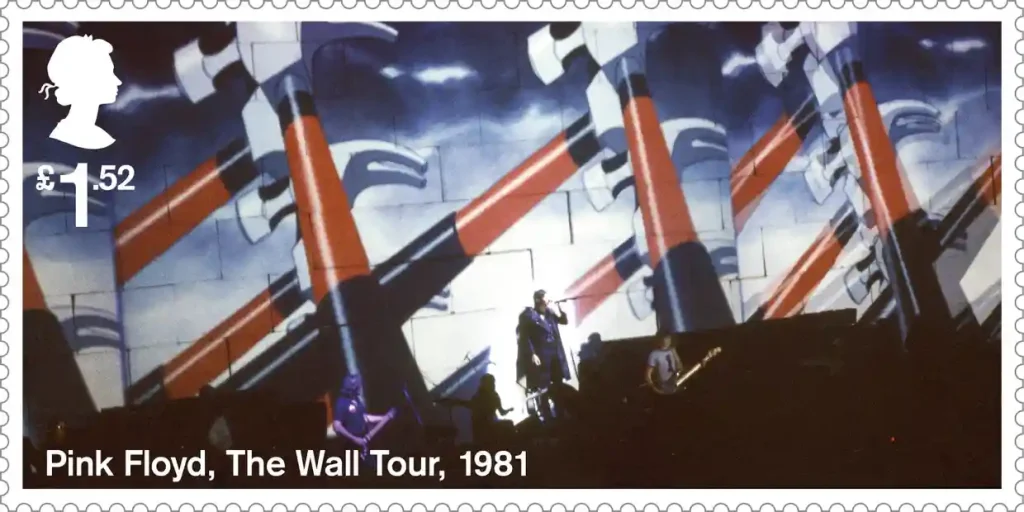
From Waters to Chaplin: Reviving the Spirit of Resistance Through Art
As the debate rages on, it is an opportune moment to revisit the power of artistic expression recognising that parody not only mocks but also conveys a profound message.
Like many artists from ancient Greece to today, they draw from experience that is then reflected in the characters they create.
The character of Pink Floyd was created from Rodger Waters’s life experiences, as he states: “My recent performance in Berlin has attracted bad faith attacks from those who want to smear and silence me because they disagree with my political views and moral principles.”
The costume was “quite clearly a statement in opposition to fascism, injustice and bigotry in all its forms”. His show starts with a statement saying he “condemns antisemitism unreservedly”.
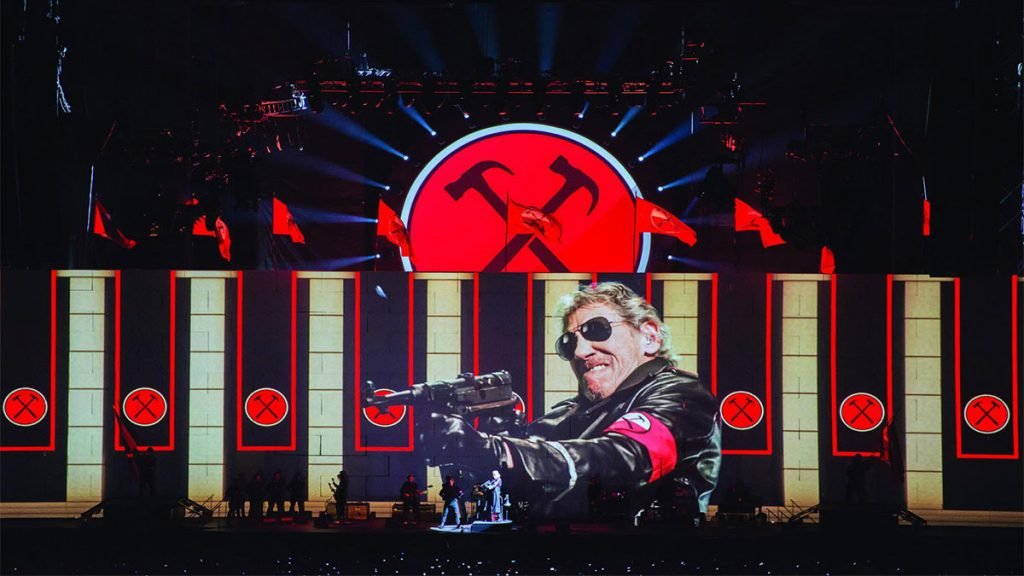
Waters continued: “Attempts to portray those elements as something else are disingenuous and politically motivated. The depiction of an unhinged fascist has been a feature of my shows since Pink Floyd’s The Wall in 1980.
“I have spent my entire life speaking out against authoritarianism and oppression wherever I see it.”
He added: “When I was a child after the war, the name of Anne Frank was often spoken in our house, she became a permanent reminder of what happens when fascism is left unchecked. My parents fought the Nazis in World War II with my father paying the ultimate price.”
It should also be understood and is extremely relevant, Waters’ father was killed at Aprilia, during the Battle of Anzio, in 1944 when he was just five months old fighting against the tyranny of the Nazis.
It is those profound experiences that shape our worldview and luckily for us, we have some great artists that use their media to convey those experiences while condensing the message into a palatable interpretation.
The Little Tramp.
For Chaplin, those experiences came after being distressed by rampant unemployment in America. That depression was the catalyst for the creation of his character and cinematic alter ego the ‘Little Tramp’ that persona embodied an impoverished man struggling to survive in capitalist society.
“The whole point of the Little Fellow,” Chaplin said in 1925 of the tramp figure, “is that no matter how down on his ass he is, no matter how well the jackals succeed in tearing him apart, he’s still a man of dignity.” The working class, the working poor, are people of great resourcefulness and dignity – not beaten …
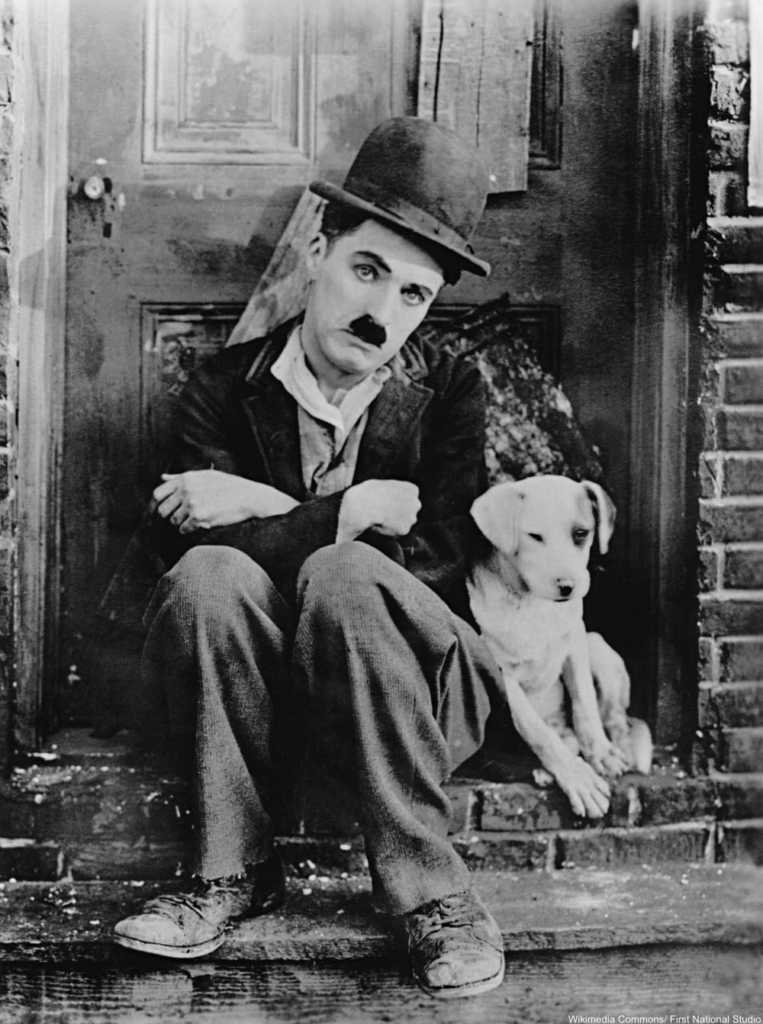
Artistic Provocation: Challenging Boundaries and Inspiring Unity
In the cases of both Waters and Chaplin, there can be seen many similarities and in many ways, the only difference expressed is in the media of their own art form but the prevailing message is categorically one of hope over adversity.
In that vain there is no better place to start than the masterpiece of Charlie Chaplin’s “The Great Dictator” a story of triumph over adversity and hope.
It is that hope that is lacking in today’s society—a society where no one offers an alternative and politicians are just the creatures of the oligarchy.
In an age where governments prioritize serving the market and big business rather than representing the people, where political parties lack vision and only pursue power for power’s sake, we find ourselves isolated in a system intentionally designed to divide us. The working class find themselves isolated, atomised within a system intentionally designed to divide us.
We are weakened in our struggle against the few who wield power within this unequal status quo, using it to subjugate us.
In an age marked by political divisions and the erosion of civil discourse, democracy calls upon us, the people, to rise above the rancour and steadfastly defend our convictions. Recent events, including the tumultuous era of Brexit, have witnessed the democratic process tainted by vulgarity, falsehoods, and acrimony from all sides.
Nevertheless, it remains vital to remember that we are part of a shared community, bound by a common history and language. Our unwavering determination to fight for the emancipation of the working class must prevail.
In an age when we, the people, face constant pressure to survive in our day-to-day lives, with rising costs of food, rents, and mortgages. Many are just one paycheck away from a debt spiral, while others face even more dire circumstances. Caught in a new manufactured crisis where the many feed the greed of the few.
Reclaiming Liberty and Overcoming Adversity.

The irony lies in the fact that the oligarchy uses the very resources that should be under public control, in this case as energy, as a weapon to oppress us under the guise of a cost-of-living crisis. Another crisis reveals the unwillingness of politicians to protect the people or enact legislation to curb the greed of globalized capital or to reclaim the natural resources that we own.
But no matter how they try to push us down it is the nature of the working class to resist, to push back against our oppressors, and if we can’t find hope in our representatives we will find it elsewhere, even amidst the challenges of our present-day world.
Buster Keaton once told a story about Chaplin from 1920. He and Chaplin shared a beer in Keaton’s home around the time Chaplin was making his film The Kid. According to Keaton, Chaplin spoke “about something called Communism which he just heard about. Communism was going to change everything, abolish poverty.” Chaplin then banged on the table and said, “What I want is that every child should have enough to eat, shoes on his feet and a roof over his head.” Keaton responded by saying, “But Charlie, do you know anyone who doesn’t want that?”
it is that hope of a better world that comes from inspiration and inspiration takes many forms, from books, films music and words. Music like that of roger walter and Pink Floyd. Words like those in Chaplin’s iconic speech “The Great Dictator”. A lesson that stands as a poignant reminder that the values of liberty, brotherhood, and equality, which once defeated fascism, must be fervently reclaimed in the face of new threats.
Chaplin’s speech not only offers guidance for the working class and indeed all citizens seeking to bridge the divisions that separate them but also challenges leaders to adopt a selfless worldview.
Although our current political leaders often fall short of this or any ideal other than self, it is increasingly evident that individuals from all walks of life must set aside their differences and unite against the unprecedented assault on our homes and families. Only through the unity of the many can we hope to prise our liberties from the powerful few.
Confronted with these daunting challenges, it is imperative that we rally together for the common good and reclaim what rightfully belongs to us. Artists like Waters and Chaplin remind us of the true enemy through their artistic interpretations and their clear messages. Charlie Chaplin’s timeless words resonate more powerfully than ever, serving as a reminder that unity and solidarity are crucial in the fight against the encroachment of the oligarchy. Drawing inspiration from the legendary speech delivered by the fictional Jewish barber-turned-hero, to win this struggle we have no choice but to set aside our differences and reclaim what is rightfully ours. Together, we can forge a path towards a future where justice, equity, and shared prosperity prevail, if we only stop letting them divide us.
The Final Speech from The Great Dictator words as relevant today as they were in 1940
Charlie Chaplin’s Greatest Speech
“I’m sorry, but I don’t want to be an emperor. That’s not my business. I don’t want to rule or conquer anyone. I should like to help everyone – if possible – Jew, Gentile – black man – white.
We all want to help one another. Human beings are like that. We want to live by each other’s happiness – not by each other’s misery. We don’t want to hate and despise one another. In this world, there is room for everyone. And the good earth is rich and can provide for everyone. The way of life can be free and beautiful, but we have lost the way.
Greed has poisoned men’s souls, has barricaded the world with hate, has goose-stepped us into misery and bloodshed. We have developed speed, but we have shut ourselves in. Machinery that gives abundance has left us in want.
Our knowledge has made us cynical. Our cleverness, hard and unkind. We think too much and feel too little. More than machinery we need humanity. More than cleverness we need kindness and gentleness. Without these qualities, life will be violent and all will be lost….
The aeroplane and the radio have brought us closer together. The very nature of these inventions cries out for the goodness in men – cries out for universal brotherhood – for the unity of us all. Even now my voice is reaching millions throughout the world – millions of despairing men, women, and little children – victims of a system that makes men torture and imprison innocent people.
To those who can hear me, I say – do not despair. The misery that is now upon us is but the passing of greed – the bitterness of men who fear the way of human progress. The hate of men will pass, and dictators die, and the power they took from the people will return to the people. And so long as men die, liberty will never perish. …..
Soldiers! don’t give yourselves to brutes – men who despise you – enslave you – who regiment your lives – tell you what to do – what to think and what to feel! Who drill you – diet you – treat you like cattle, use you as cannon fodder. Don’t give yourselves to these unnatural men – machine men with machine minds and machine hearts! You are not machines! You are not cattle! You are men! You have the love of humanity in your hearts! You don’t hate! Only the unloved hate – the unloved and the unnatural! Soldiers! Don’t fight for slavery! Fight for liberty!
In the 17th Chapter of St Luke it is written: “the Kingdom of God is within man” – not one man nor a group of men, but in all men! In you! You, the people have the power – the power to create machines. The power to create happiness! You, the people, have the power to make this life free and beautiful, to make this life a wonderful adventure.
Then – in the name of democracy – let us use that power – let us all unite. Let us fight for a new world – a decent world that will give men a chance to work – that will give youth a future and old age a security. By the promise of these things, brutes have risen to power. But they lie! They do not fulfil that promise. They never will!
Dictators free themselves but they enslave the people! Now let us fight to fulfil that promise! Let us fight to free the world – to do away with national barriers – to do away with greed, with hate and intolerance. Let us fight for a world of reason, a world where science and progress will lead to all men’s happiness. Soldiers! in the name of democracy, let us all unite!
Final speech from The Great Dictator Copyright © Roy Export S.A.S. All rights reserved
The Great Dictator was Chaplin’s first film with dialogue. Chaplin plays both a little Jewish barber, living in the ghetto, and Hynkel, the dictator ruler of Tomainia. In his autobiography Chaplin quotes himself as having said: “One doesn’t have to be a Jew to be anti-Nazi. All one has to be is a normal decent human being.”
Chaplin and Hitler were born within a week of one another. “There was something uncanny in the resemblance between the Little Tramp and Adolf Hitler, representing opposite poles of humanity, ” writes Chaplin biographer David Robinson, reproducing an unsigned article from ‘The Spectator’ dated 21st April 1939:
“Providence was in an ironical mood when, fifty years ago this week, it was ordained that Charles Chaplin and Adolf Hitler should make their entry into the world within four days of each other….Each in his own way has expressed the ideas, sentiments, aspirations of the millions of struggling citizens ground between the upper and the lower millstone of society. (…) Each has mirrored the same reality – the predicament of the “little man” in modern society. Each is a distorting mirror, the one for good, the other for untold evil.”
Chaplin spent many months drafting and re-writing the speech for the end of the film, a call for peace from the barber who has been mistaken for Hynkel.
Many people criticised the speech and thought it was superfluous to the film. Others found it uplifting. Regrettably, Chaplin’s words are as relevant today as they were in 1940.
By Paul Knaggs, Labour Heartlands.
Support Independent Journalism Today
Our unwavering dedication is to provide you with unbiased news, diverse perspectives, and insightful opinions. We're on a mission to ensure that those in positions of power are held accountable for their actions, but we can't do it alone. Labour Heartlands is primarily funded by me, Paul Knaggs, and by the generous contributions of readers like you. Your donations keep us going and help us uphold the principles of independent journalism. Join us in our quest for truth, transparency, and accountability – donate today and be a part of our mission!
Like everyone else, we're facing challenges, and we need your help to stay online and continue providing crucial journalism. Every contribution, no matter how small, goes a long way in helping us thrive. By becoming one of our donors, you become a vital part of our mission to uncover the truth and uphold the values of democracy.
While we maintain our independence from political affiliations, we stand united against corruption, injustice, and the erosion of free speech, truth, and democracy. We believe in the power of accurate information in a democracy, and we consider facts non-negotiable.
Your support, no matter the amount, can make a significant impact. Together, we can make a difference and continue our journey toward a more informed and just society.
Thank you for supporting Labour Heartlands

